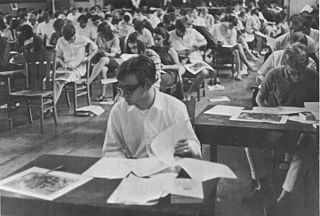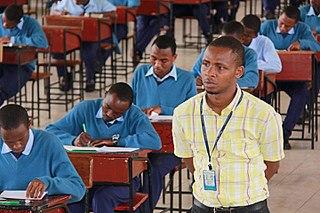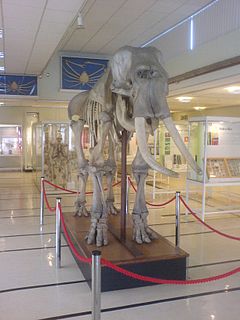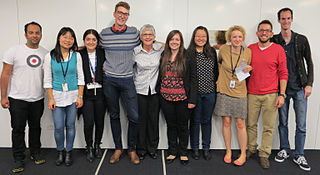 W
WAnti-intellectualism has been defined as, "A philosophic doctrine that assigns reason or intellect a subordinate place in the scheme of things and questions or denies the ability of the intellect to comprehend the true nature of things ... Anything that celebrates feeling over thought, intuition over logic, action over contemplation, results over means, experience over tradition and order tends toward anti-intellectualism."
 W
WA bulletin board is a surface intended for the posting of public messages, for example, to advertise items wanted or for sale, announce events, or provide information. Bulletin boards are often made of a material such as cork to facilitate addition and removal of messages, as well as a writing surface such as blackboard or whiteboard. A bulletin board which combines a pinboard (corkboard) and writing surface is known as a combination bulletin board. Bulletin boards can also be entirely in the digital domain and placed on computer networks so people can leave and erase messages for other people to read and see, as in a bulletin board system.
 W
WIn the United States, a class ring is a ring worn by students and alumni to commemorate their graduation, generally for a high school, college, or university.
 W
WIn higher education, a comprehensive examination, often abbreviated as "comps", is a specific type of examination that must be completed by graduate students in some disciplines and courses of study, and also by undergraduate students in some institutions and departments. Unlike final examinations, comprehensive examinations are not linked to any particular course, but rather test knowledge across one or more general fields of study.
 W
WExam proctoring is a method of ensuring academic integrity. It includes invigilation of students, while taking tests, examinations, or quizzes. Exam proctoring is used in a variety of contexts, including primary, secondary and higher education, as well as standardized test environments, and some professional accreditation exams.
 W
WAn academic, or scientific genealogy organizes a family tree of scientists and scholars according to mentoring relationships, often in the form of dissertation supervision relationships, and not according to genetic relationships as in conventional genealogy. Since the term academic genealogy has now developed this specific meaning, its additional use to describe a more academic approach to conventional genealogy would be ambiguous, so the description scholarly genealogy is now generally used in the latter context.
 W
WA teaching assistant or teacher's aide (TA) or education assistant (EA) or team teacher (TT) is an individual who assists a teacher with instructional responsibilities. TAs include graduate teaching assistants (GTAs), who are graduate students; undergraduate teaching assistants (UTAs), who are undergraduate students; secondary school TAs, who are either high school students or adults; and elementary school TAs, who are adults. By definition, TAs assist with classes, but many graduate students serve as the sole instructor for one or more classes each semester as a teaching fellow or graduate student instructor, although in some states, such as Florida, they are called "teaching assistants". Graduate and adult TAs generally have a fixed salary determined by each contract period ; however, undergraduates and high school students are sometimes unpaid and in the US and other countries with the credit system, receive course credits in return for their assistance. Teaching assistants often help the main teacher by supporting students with learning disabilities, such as ADHD, Autism, or physical disabilities, such as blindness or deafness.
 W
WAn intellectual is a person who engages in critical thinking, research, and reflection about the reality of society, who may also propose solutions for the normative problems of society, and thus gains authority as a public intellectual. Coming from the world of culture, either as a creator or as a mediator, the intellectual participates in politics, either to defend a concrete proposition or to denounce an injustice, usually by either rejecting or producing or extending an ideology, and by defending a system of values. According to Thomas Sowell, as a descriptive term of person, personality, and profession, the word intellectual identifies three traits:Educated; erudition for developing theories; Productive; creates cultural capital in the fields of philosophy, literary criticism, and sociology, law, medicine, and science, etc.; and Artistic; creates art in literature, music, painting, sculpture, etc.
 W
WIntellectualism refers to related mental perspectives that emphasize the use, the development, and the exercise of the intellect; and also identifies the life of the mind of the intellectual person. In the field of philosophy, “intellectualism” is synonymous with rationalism, knowledge derived from reason. Moreover, the term intellectualism can also have a socially negative connotation about a man or woman intellectual who gives “too much attention to thinking” and who shows an “absence of affection and feeling”.
 W
WInterdisciplinarity or interdisciplinary studies involves the combination of two or more academic disciplines into one activity. It draws knowledge from several other fields like sociology, anthropology, psychology, economics etc. It is about creating something by thinking across boundaries. It is related to an interdiscipline or an interdisciplinary field, which is an organizational unit that crosses traditional boundaries between academic disciplines or schools of thought, as new needs and professions emerge. Large engineering teams are usually interdisciplinary, as a power station or mobile phone or other project requires the melding of several specialties. However, the term "interdisciplinary" is sometimes confined to academic settings.
 W
WA lectern is a reading desk, with a slanted top, usually placed on a stand or affixed to some other form of support, on which documents or books are placed as support for reading aloud, as in a scripture reading, lecture, or sermon. To facilitate eye contact and improve posture when facing an audience, lecterns may have adjustable height and slant. People generally use lecterns while standing.
 W
WA university museum is a repository of collections run by a university, typically founded to aid teaching and research within the institution of higher learning. The Ashmolean Museum at the University of Oxford in England is an early example, originally housed in the building that is now the Museum of the History of Science. A more recent example is the Holburne Museum of Art in Bath, originally constructed as a hotel in 1796 it is now the official museum of the University of Bath.
 W
WOpen Access Week is an annual scholarly communication event focusing on open access and related topics. It takes place globally during the last full week of October in a multitude of locations both on- and offline. Typical activities include talks, seminars, symposia, or the announcement of open access mandates or other milestones in open access. For instance, the Royal Society chose Open Access Week 2011 to announce that they would release the digitized backfiles of their archives, dating from 1665 to 1941.
 W
WStudent orientation or new student orientation is a period before the start of an academic year at a university or tertiary institutions. A variety of events are held to orient and welcome new students during this period. The name of the event differs across institutions. Post-secondary institutions offer a variety of programs to help orient first year students. These programs can range from voluntary community building activities to mandatory credit-based courses designed to support students academically, socially, and emotionally. Some of these programs occur prior to the start of classes while other programs are offered throughout the school year. A number of research studies have been done to determine the factors to be considered when designing orientation/transition programs.
 W
WThe term relative age effect (RAE), also known as birthdate effect or birth date effect, is used to describe a bias, evident in the upper echelons of youth sport and academia, where participation is higher amongst those born early in the relevant selection period than would be expected from the normalised distribution of live births. The selection period is usually the calendar year, the academic year or the sporting season. The difference in maturity - which can be extreme at young ages: a six-year old born in January is almost 17% older than a six-year old born in December in the same year - causes a performance gap that persists over time.
 W
WA scholar is a person who pursues academic and intellectual activities, particularly those that develop expertise in an area of study. A scholar may also be an academic, who works as a professor, teacher or researcher at a university or other higher education institution. An academic usually holds an advanced degree or terminal degree such as a PhD. Some independent scholars, such as philosophers and public intellectuals work outside of academia. They may still contribute to academic journals and participate in scholarly conferences even though they are unaffiliated with a university.
 W
WThe scholarly method or scholarship is the body of principles and practices used by scholars and academics to make their claims about the subject as valid and trustworthy as possible, and to make them known to the scholarly public. It is the methods that systemically advance the teaching, research, and practice of a given scholarly or academic field of study through rigorous inquiry. Scholarship is noted by its significance to its particular profession, and is creative, can be documented, can be replicated or elaborated, and can be and is peer-reviewed through various methods. The Scholarly Method includes the subcategories of the Scientific Method, in which scientists prove their claims and the Historical Method, in which historians verify their claims.
 W
WA scholarship is an award of financial aid for a student to further their education at a private elementary or secondary school, or a private or public post-secondary college, university, or other academic institution. Scholarships are awarded based upon various criteria, such as academic merit, diversity and inclusion, athletic skill, financial need, among others. Or some combination of these criteria. Scholarship criteria usually reflect the values and goals of the donor or founder of the award. While scholarship recipients are not required to repay scholarships, the awards may require that the recipient continue to meet certain requirements during their period of support, such maintaining a minimum grade point average or engaging in a certain activity. Scholarships may provide a monetary award, an in-kind award, or a combination
 W
WA thesis or dissertation is a document submitted in support of candidature for an academic degree or professional qualification presenting the author's research and findings. In some contexts, the word "thesis" or a cognate is used for part of a bachelor's or master's course, while "dissertation" is normally applied to a doctorate, while in other contexts, the reverse is true. The term graduate thesis is sometimes used to refer to both master's theses and doctoral dissertations.
 W
WThe Three Minute Thesis competition or '3MT, is an annual competition held in over 200 universities worldwide. It is open to PhD students, and challenges participants to present their research in just 180 seconds, in an engaging form that can be understood by an intelligent audience with no background in the research area. This exercise develops presentation, research and academic communication skills and supports the development of research students' capacity to explain their work effectively.
 W
WAcademic writing or scholarly writing is nonfiction produced as part of academic work, including reports on empirical fieldwork or research in facilities for the natural sciences or social sciences, monographs in which scholars analyze culture, propose new theories, or develop interpretations from archives, as well as undergraduate versions of all of these.